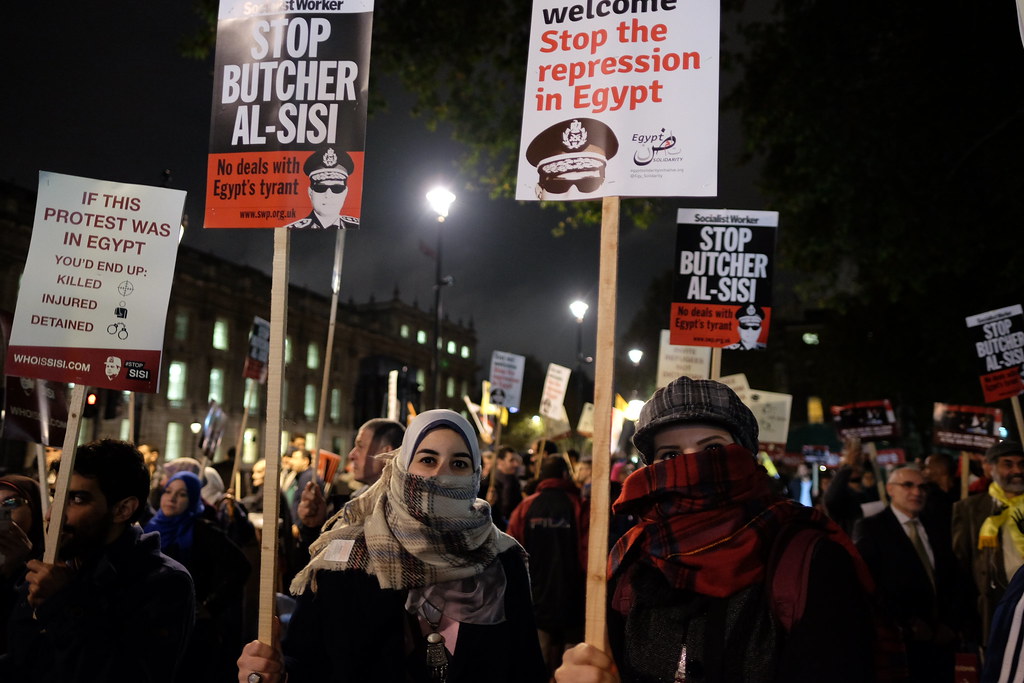The State joint declaration, delivered today under item 4 of the 46th session of the UN Human Rights Council (HRC) ends years of a lack of collective action at the HRC on Egypt, despite the sharply deteriorating human rights situation in the country. Under Finland’s leadership, the HRC sent an over-due message to the Egyptian government that it must end its restrictions on freedom of expression, peaceful assembly and association – starting by releasing the thousands arbitrarily detained, protecting those in custody from torture and other ill-treatment, and ending the crackdown on peaceful activism.
The Special Rapporteur on counter-terrorism and the Special Rapporteur on human rights defenders used Egypt as a case in point of countries misusing counter-terrorism measures to quash human rights defenders and any criticism of the government.
The 32 States* urged Egypt to:
- Guarantee space for civil society actors, including human rights defenders and journalists, to work without fear of intimidation, harassment, arrest, detention or any other form of reprisal, and lift travel bans and asset freezes against human rights defenders – including EIPR staff
- Lift restrictions on media and digital freedom, end the practice of blocking the websites of independent media outlets, and release all journalists who have been arrested in the course of practicing their profession
- End the use of terrorism charges to hold human rights defenders and civil society activists in extended pre-trial detention and the practice of adding detainees to new cases with similar charges after the legal limit for pre-trial detention has expired
- Cease the use of the terrorism entities list to punish individuals for exercising their right to freedom of expression
- Guarantee due process, including ending limitations on lawyers seeing evidence or accessing their clients
- Ensure accountability and immediate end of impunity
- Constructively engage with the Office of the High Commissioner, and fully cooperate with UN Special Procedures mandates
Despite repeated statements by the Special Procedures and the High Commissioner, Egypt continues to arbitrarily detain human rights defenders, civil society activists, lawyers, researchers, journalists, political opponents and their families. The UN Working Group on Arbitrary Detention has found that arbitrary detention is a systemic problem in Egypt.
UN Special Procedures have repeatedly called on Egypt to “promptly address its prison conditions and reverse what appears to be deeply entrenched practices that are severely infringing on people’s right to life, the right not to be subjected to arbitrary detention, the right not to be subjected to torture or ill-treatment, the right to due process and a fair trial, and adequate medical care.” Women human rights defenders and LGBTI defenders face heightened risks in detention. The CEDAW Committee raised its concerns over the “ill-treatment of transgender women in detention”.
ISHR, together with more than 100 NGOs from around the world, wrote to States in early 2021, warning that the Egyptian government is attempting to “annihilate” human rights organisations and eradicate the human rights movement in the country through sustained, widespread, and systematic attacks.
The organisations had asked States to adopt a resolution establishing a monitoring and reporting mechanism on Egypt.[1] The joint State declaration delivered today is a significant step and should be followed up on by concrete action toward achieving this goal.
The last joint statement on the human rights situation in Egypt at the HRC was delivered by Iceland and co-signed by 26 countries in March 2014.
Since that time, the human rights situation in Egypt has deteriorated dramatically. The Egyptian authorities, with the complicity of prosecutors and judges, have arrested, detained or prosecuted thousands, including hundreds of human rights defenders, religious minorities’ rights activists, peaceful protesters, journalists, academics, artists, politicians and lawyers.
Many have been forcibly disappeared, tortured or otherwise ill-treated, and detained for months or years in inhumane conditions without trial. Those detained are regularly held on the basis of unfounded terrorism-related charges. If referred to trial individuals are often convicted in grossly unfair proceedings before military courts and through mass trials. Many have been sentenced to death and executed after unfair trials that have relied on statements likely obtained through torture. The authorities have also used morality and debauchery laws to arrest and detain women influencers, sexual violence survivors and witnesses, and LGBTI individuals and activists.
The UN Committee against Torture said in 2017 following an inquiry on Egypt that the facts gathered by the committee “lead to the inescapable conclusion that torture is a systematic practice in Egypt.” ISHR also recalls that Egypt has refused to acknowledge the practice of torture and ill-treatment in detention centres, and has not yet published the measures taken to implement the recommendations by the UN Committee against Torture’s confidential inquiry.
*States who signed the joint statement: Finland, Australia, Austria, Belgium, Bosnia and Herzegovina, Bulgaria, Canada, Costa Rica, Czech Republic, Denmark, Estonia, France, Germany, Iceland, Ireland, Italy, Latvia, Liechtenstein, Lithuania, Luxembourg, Marshall Islands, Montenegro, the Netherlands, New Zealand, North Macedonia, Norway, Slovenia, Spain, Sweden, Switzerland, the United Kingdom, the United States of America
Other governments can join the declaration until two weeks after the end of the current HRC session.
**NGO signatories: Amnesty International, The Cairo Institute for Human Rights Studies (CIHRS), DIGNITY – Danish Institute Against Torture, EuroMed Rights, The Freedom Initiative, Human Rights Watch (HRW), International Federation for Human Rights (FIDH), The International Commission of Jurists (ICJ), The Project on Middle East Democracy (POMED).
[1] Read here an updated analysis of why the human rights situation in Egypt merits the Council’s attention. ISHR recalls that the government’s refusal to address key concerns raised by States in its response to the UPR in March 2020 demonstrated its lack of political will to address its deep challenges and to engage constructively with the Council.
Photo: ” Stop the repression in Egypt – Stop Sisi’s visit to London”. by alisdare1 is licensed under CC BY-SA 2.0




